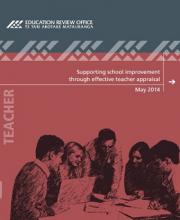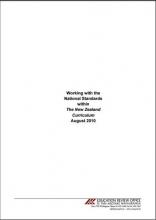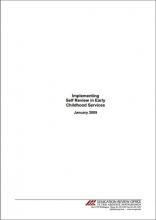- Topics: Assessment, Self-review
- Published: 24 Apr 2018
Evaluation at a glance: A decade of assessment in New Zealand Primary Schools - Practice and trends
High quality assessment and evaluation allows us to focus on student progress and outcomes at classroom, school and system levels. It helps teachers, schools and systems to report on student achievement across points in time, and provide information for parents, trustees and the public about the quality of education.
- Published: 16 May 2014
Supporting school improvement through effective teacher appraisal
In 2013 the Education Review Office (ERO) evaluated the quality of teacher appraisal systems in schools using online surveys of principals and information from 200 school reviews. This report presents the findings of ERO’s evaluation of schools’ approaches to teacher appraisal.
- Published: 06 Apr 2011
Working with the National Standards: Raising student achievement in reading, writing and mathematics
This is the latest report in the series of ERO's national evaluation reports about the implementation of the National Standards in English-medium schools with students in Years 1 to 8.The evaluation involved 237 schools reviewed by ERO in Terms 3 and 4, 2010. The report indicates that schools are still at varying stages of working with the National Standards.
- Published: 09 Aug 2010
Working with the National Standards within the New Zealand Curriculum
ERO evaluated preparedness to work with the National Standards within The New Zealand Curriculum in 228 schools during Terms 1 and 2, 2010. ERO found that most schools were well prepared or had preparation under way, and in many cases the preparations focused on aligning existing benchmarks and expectations with the standards.
- Published: 01 Jan 2009
Implementing Self Review in Early Childhood Services
The Education Review Office (ERO) undertook a national evaluation of the implementation of self review in 397 services in Terms 1, 2 and 3, 2008. The evaluation focused on how well self review was understood, supported and implemented in each service and the extent to which it led to improved management and educator practice.
- Published: 01 Nov 2007
The Quality of Assessment in Early Childhood Education
Assessment informs an early childhood service’s programme and educators’ teaching practices. ERO evaluated the quality of assessment in all the early childhood services reviewed in Terms 3 and 4, 2006.
Services were at varying stages in their understanding and implementation of assessment practices, as not all had yet participated in professional development.
- Published: 01 Jun 2007
The Collection and Use of Assessment Information: Good Practice in Secondary Schools
ERO evaluated the collection and use of assessment information in schools in 2006. The evaluation concluded that more work can be done to improve assessment practice in schools. This complementary report aims to help secondary schools review their assessment practice. It highlights characteristics common to high quality assessment practices and includes examples of good practice.
- Published: 01 Jun 2007
The Collection and Use of Assessment Information: Good Practice in Primary Schools
ERO evaluated the collection and use of assessment information in schools in 2006. The evaluation concluded that more work can be done to improve assessment practice in schools. This report builds on this finding by giving examples of good practice in the collection and use of assessment information in primary schools. The report also includes three detailed case studies.
- Published: 01 Mar 2007
The Collection and Use of Assessment Information in Schools
Knowing what students know and can do is fundamental to effective teaching and students’ learning. Teachers need to assess student achievement to know whether or not their teaching is meeting the learning needs of their students.
In 2006, ERO evaluated how effectively schools collected and used assessment information. This report details the findings of that evaluation and recommends what can be done to make assessment practices in schools more effective.









